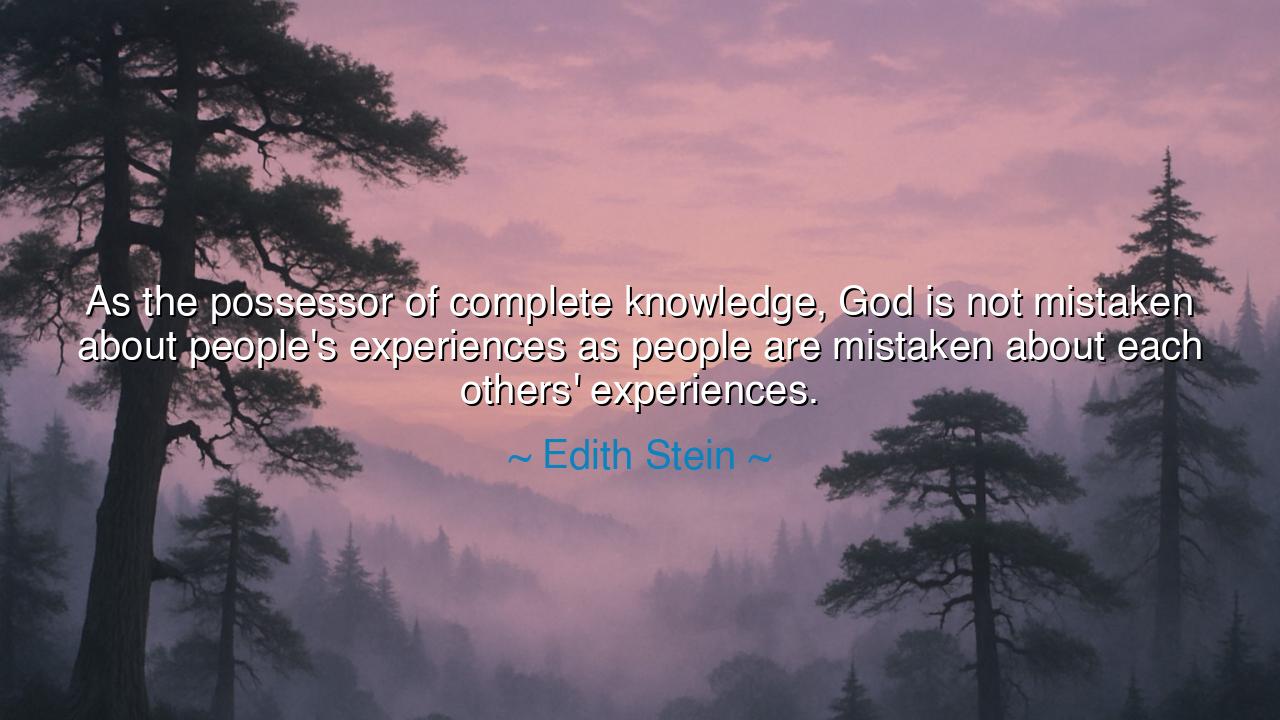
As the possessor of complete knowledge, God is not mistaken about
As the possessor of complete knowledge, God is not mistaken about people's experiences as people are mistaken about each others' experiences.






“As the possessor of complete knowledge, God is not mistaken about people's experiences as people are mistaken about each other's experiences.” Thus spoke h Stein, the philosopher, mystic, and saint who journeyed from the darkness of human reason to the radiant light of divine truth. In these words, she draws a line between human understanding and divine knowledge, reminding us that while we see through shadows and fragments, God beholds the whole — the full tapestry of every soul, every pain, every joy, every secret longing. To her, this truth was not an abstraction but a revelation born from suffering and compassion, for Stein lived through one of the most turbulent ages of mankind, and yet her faith in the wisdom of the divine never wavered.
h Stein was both philosopher and martyr. Trained under Edmund Husserl, the father of phenomenology, she sought to understand consciousness — the mystery of how we perceive and interpret the world. Yet, through her studies, she came to see the limits of human insight. No matter how deeply we observe another, she realized, we can never fully know another’s soul. Our judgments are colored by bias, our empathy constrained by our own experience. Thus, people often misunderstand one another, mistaking appearances for truth, and emotions for reality. But in God, said Stein, there is no such error — for He possesses complete knowledge, seeing not merely the outer act but the inner motive, not the word but the heart behind it.
The essence of her statement lies in humility. It teaches that human understanding is partial and prone to error, and that the source of all misjudgment is our limited vision. We look upon others and presume to know their hearts — why they act, why they sin, why they grieve — and in doing so, we wound both them and ourselves. We condemn when we should console, and we turn away when we should embrace. But God, possessing the fullness of truth, never mistakes the brokenness of a heart for malice, nor the silence of sorrow for indifference. His knowledge is not cold or mechanical; it is omniscient love, perceiving the suffering beneath every sin, and the hope that flickers beneath every despair.
History, too, offers proof of this divine perspective. Consider the story of Mary Magdalene, a woman cast out by society and remembered only for her sins. The people of her time misjudged her, calling her fallen, unworthy, unclean. Yet when she came to Christ, He did not see the label that others had branded upon her — He saw her heart. He saw repentance, courage, and a love that surpassed the scorn of men. Where others saw guilt, He saw redemption. In that divine recognition, her soul was healed. So it is with all humanity: while man sees the stain, God sees the struggle. While man sees failure, God sees the faith that remains unbroken.
This is the wisdom h Stein came to embody. In her own life, she was misunderstood by many — by her peers who could not understand her conversion from Judaism to Christianity, by her nation that rejected her for her race, by a world that could not comprehend her courage. Yet she walked forward, serene in the knowledge that though people misunderstood her, God knew her completely. When she was taken to Auschwitz, she did not go as a victim of human cruelty, but as a servant of divine truth, trusting in the One who sees all, who understands all, and who is never mistaken about the worth of a single soul.
From her life and her words, we learn a sacred lesson: that judgment belongs only to God, and that our task is not to presume knowledge, but to seek understanding. We are called to humility in our thoughts, compassion in our dealings, and patience in our discernment. For every person we meet carries unseen burdens and invisible battles, and when we fail to see them, we add to their weight. To live wisely, therefore, is to remember that our sight is limited, but our hearts may still be open.
So, my children, take this truth as a guiding light: trust not in the completeness of your own understanding, but in the infinite wisdom of God. Strive to see others not through the lens of judgment, but through the eyes of mercy. Ask not, “What do I know about this person?” but rather, “What does God know that I do not?” In doing so, you will grow closer to the divine way of seeing — one that perceives beyond error, beyond appearance, beyond pain — and you will find peace.
For as h Stein teaches, God’s knowledge is perfect because His love is perfect. He does not err because He does not forget the sacred truth of every soul — that each one, no matter how lost or misunderstood, is still known, still seen, and still cherished. And if we, even dimly, can learn to see as He sees, then our own hearts will no longer be mistaken — for they will become reflections of His eternal understanding.






AAdministratorAdministrator
Welcome, honored guests. Please leave a comment, we will respond soon